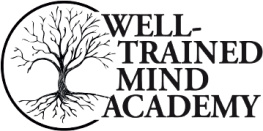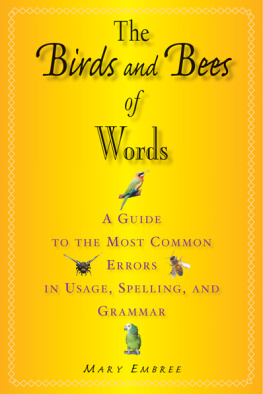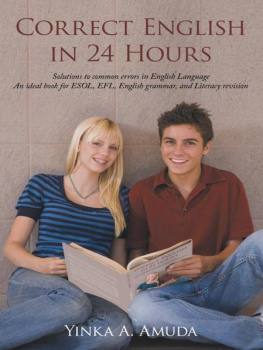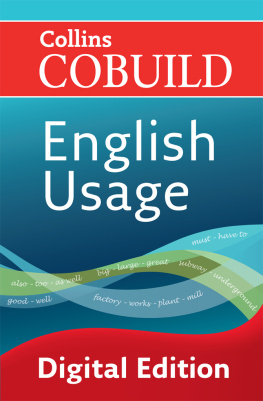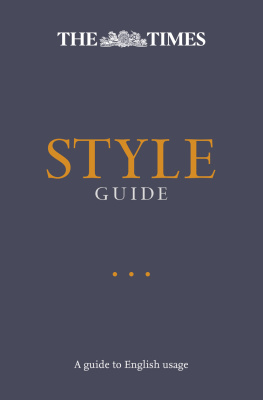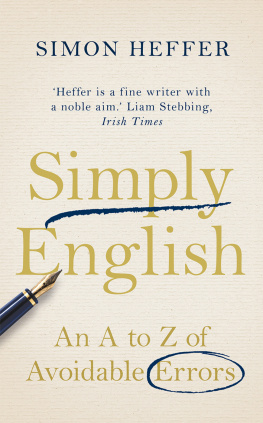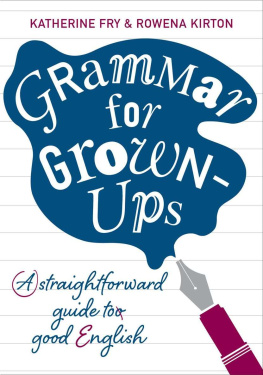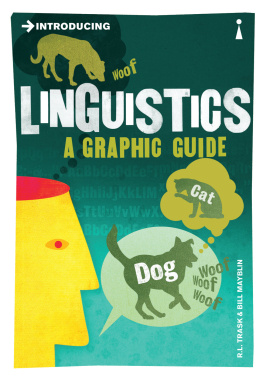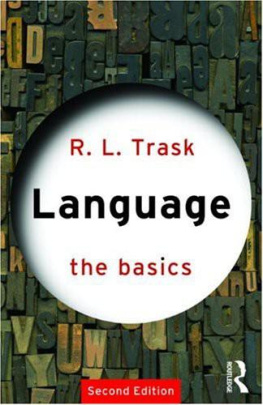Trask - Mind the gaffe: the Penguin guide to common errors in English
Here you can read online Trask - Mind the gaffe: the Penguin guide to common errors in English full text of the book (entire story) in english for free. Download pdf and epub, get meaning, cover and reviews about this ebook. City: London;New York, year: 2009, publisher: Penguin Books Ltd, genre: Children. Description of the work, (preface) as well as reviews are available. Best literature library LitArk.com created for fans of good reading and offers a wide selection of genres:
Romance novel
Science fiction
Adventure
Detective
Science
History
Home and family
Prose
Art
Politics
Computer
Non-fiction
Religion
Business
Children
Humor
Choose a favorite category and find really read worthwhile books. Enjoy immersion in the world of imagination, feel the emotions of the characters or learn something new for yourself, make an fascinating discovery.

- Book:Mind the gaffe: the Penguin guide to common errors in English
- Author:
- Publisher:Penguin Books Ltd
- Genre:
- Year:2009
- City:London;New York
- Rating:5 / 5
- Favourites:Add to favourites
- Your mark:
- 100
- 1
- 2
- 3
- 4
- 5
Mind the gaffe: the Penguin guide to common errors in English: summary, description and annotation
We offer to read an annotation, description, summary or preface (depends on what the author of the book "Mind the gaffe: the Penguin guide to common errors in English" wrote himself). If you haven't found the necessary information about the book — write in the comments, we will try to find it.
Trask: author's other books
Who wrote Mind the gaffe: the Penguin guide to common errors in English? Find out the surname, the name of the author of the book and a list of all author's works by series.
Mind the gaffe: the Penguin guide to common errors in English — read online for free the complete book (whole text) full work
Below is the text of the book, divided by pages. System saving the place of the last page read, allows you to conveniently read the book "Mind the gaffe: the Penguin guide to common errors in English" online for free, without having to search again every time where you left off. Put a bookmark, and you can go to the page where you finished reading at any time.
Font size:
Interval:
Bookmark:
PENGUIN BOOKS
Larry Trask was born in western New York State in 1944. In 1970 he came to England and in 1983 he obtained his Ph.D. from the University of London. He taught at the University of Liverpool from 1979 to 1988; since then he has taught in the School of Cognitive and Computing Sciences at the University of Sussex. His special interests are historical linguistics, grammar and the Basque language. He is the author of a number of books, including A Dictionary of Grammatical Terms in Linguistics, Language Change, Language: The Basics, The Penguin Guide to Punctuation and The Penguin Dictionary of English Grammar.
The Penguin Guide to Common Errors in English
R.L.Trask

PENGUIN BOOKS
PENGUIN BOOKS
Published by the Penguin Group
Penguin Books Ltd, 80 Strand, London WC2R 0RL , England
Penguin Putnam Inc., 375 Hudson Street, New York, New York 10014, USA
Penguin Books Australia Ltd, 250 Camberwell Road, Camberwell, Victoria 3124, Australia
Penguin Books Canada Ltd, 10 Alcorn Avenue, Toronto, Ontario, Canada M4V 3B2
Penguin Books India (P) Ltd, 11 Community Centre, Panchsheel Park, New Delhi 110 017, India
Penguin Books (NZ) Ltd, Cnr Rosedale and Airborne Roads, Albany, Auckland, New Zealand
Penguin Books (South Africa) (Pty) Ltd, 24 Sturdee Avenue, Rosebank 2196, South Africa
Penguin Books Ltd, Registered Offices: 80 Strand, London WC2R 0RL , England
www.penguin.com
First published as a Penguin hardback 2001
Published in paperback in Penguin Books 2002
Copyright R. L. Trask, 2001
All rights reserved
The moral right of the author has been asserted
Except in the United States of America, this book is sold subject to the condition that it shall not, by way of trade or otherwise, be lent, re-sold, hired out, or otherwise circulated without the publishers prior consent in any form of binding or cover other than that in which it is published and without a similar condition including this condition being imposed on the subsequent purchaser
ISBN: 978-0-14-194136-3
For my Jan
I am indebted to Jan Lock and to Martin Toseland, Myrna Blumberg, Emma Horton and the Penguin proofreaders for their valuable comments on a draft of this book, and to my linguistic colleagues at Sussex for assistance with certain vexed points. Any errors remain my own responsibility.
As you know, English is spoken and written in a huge variety of forms. A Chicago taxi driver does not talk like a Surrey stockbroker. A student being interviewed for a job does not speak the way he speaks in the bar with his friends. The English in most national tabloid newspapers does not look like the English in most serious broadsheet newspapers, and neither looks quite like the English in a scientific journal.
All of these varieties of English are appropriate to their circumstances. However, there is one variety of English that occupies a rather special position everywhere in the English-speaking world. This variety is standard written English, sometimes also called edited English. Standard written English is the variety of English used in all careful writing, apart from certain styles of literature. It is the kind of English expected in student essays and dissertations, in business letters and reports, in non-fiction books, in serious newspapers, and in most other kinds of writing.
Unlike most other kinds of English, standard written English is strongly codified. That is, there is almost total agreement as to which forms and usages form part of it, and which do not. So, for example, mischievous is a standard spelling, but *mischievious is not. (Throughout this book, an asterisk marks a form or usage which is not acceptable in standard written English.) Likewise, this number of students is standard, but *this amount of students is not. Less obviously, perhaps, the sentence * Was any action decided to be taken? is not accepted as part of the standard, while Was any action taken? is indisputably standard.
Mastery of standard written English is a requirement for many professions, and it is highly desirable in many others. But nobody comes naturally equipped with this mastery. Standard written English has to be acquired, usually by formal education. Sadly, however, in recent years schools in most English-speaking countries have pulled back from teaching this material. As a result, even university graduates with good degrees often find themselves with a command of standard English that is at best inadequate and at worst distressing. This is not a trivial problem, since a poor command of the conventions of standard English will often make a very bad impression on those who must read your writing.
Consider the following passage, which is taken from an expensively printed advertising brochure put out by a well-known chain of stores selling electrical goods, and which was meant to be written in standard English:
Micro Systems are defined by their amazingly compact size, so are ideal for places were space is at a premium Many come with a built in timer and clock, mean their ideal for the bedroom and replacing the need for a radio alarm clock.
This passage contains at least six outright errors, and some of them, such as the use of were for where, are shocking to any reader with pretensions to literacy. It is hard to believe that a successful company paid somebody to write this passage, and that no one else in the company noticed anything wrong with it. Many readers will inevitably respond to such stuff by wondering If this is their idea of good English, whats their idea of a good product?
Mastery of standard English is worth acquiring, and lack of it is a severe handicap. Recently I had to read a final-year dissertation written by a university undergraduate. In content, it was striking, even brilliant, and the student who wrote it showed a clear capacity for doing original research. However, she was virtually incapable of constructing a grammatical sentence in standard English, and her work, which should have been a pleasure to read, was in fact tedious, exasperating, annoying, and at times hard to follow all because of her poor command of standard English. Regardless of her talent, she will never get an academic job with such inadequate English.
The purpose of this book is to help you with your written English. I hope your English is already better than what you saw in the dreadful example above. But all of us can learn ways of improving our writing. I myself, after thirty years of teaching and writing, am still learning ways of improving my written English.
Many other usage handbooks exist, but some of them are a little reluctant to lay down the law. They often tell the reader instead Well, some people prefer this, but other people prefer that. I assume that you dont want to hear this. Instead, I expect, you want to read This is right, but that is wrong. As far as possible, Ill try to say exactly that. This handbook adopts a much blunter tone than do most others. But sometimes its just not possible to take such an uncompromising line. There are two reasons for this, a small one and a big one.
First, the small one. Standard written English comes in two slightly different versions: the British version and the American version. Fortunately, the differences between the two versions are not great, except in vocabulary. This book is written by an American who works in Britain, and it covers most of the significant differences between the British standard and the American standard in spelling, in punctuation, in grammar, and in the use of words. Naturally, you should try to stick consistently to one version or the other, since mixing British and American conventions will please nobody.
Font size:
Interval:
Bookmark:
Similar books «Mind the gaffe: the Penguin guide to common errors in English»
Look at similar books to Mind the gaffe: the Penguin guide to common errors in English. We have selected literature similar in name and meaning in the hope of providing readers with more options to find new, interesting, not yet read works.
Discussion, reviews of the book Mind the gaffe: the Penguin guide to common errors in English and just readers' own opinions. Leave your comments, write what you think about the work, its meaning or the main characters. Specify what exactly you liked and what you didn't like, and why you think so.

